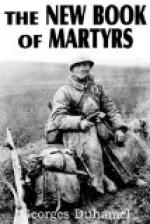There is a kind of mania for organisation which is the sworn enemy of order; in its efforts to discover the best place for everything, it ends by diverting everything from its right function and locality, and making everything as inopportune as itself. It was a mistake to cut off all the lights this evening, on some pretext or the other. The rooms of the old mansion are not packed with bales of cotton, but with men who have anxious minds and tortured bodies.
A mournful darkness suddenly reigned; and outside, the incessant storm that rages in this country swept along like a river in spate.
Little Rochet was dreaming in the liquid light of the lamp, with hands crossed on his breast, and the delicate profile of an exhausted saint.
He was dreaming of vague and exquisite things, for cruel fever has moments of generosity between two nightmares. He was dreaming so sweetly that he forgot the abominable stench of his body, and that a smile touched the two deep wrinkles at the corners of his mouth, set there by a week of agony.
But all the lamps have been put out, and the noise of the hurricane has become more insistent, and the wounded have ceased talking, for darkness discourages conversation.
There are some places where the men with whom the shells have dealt mercifully and whose wounds are only scratches congregate. These have only the honour of wounds, and what may be called their delights. ... But here, we have only the worst cases; and here they have to await the supreme decision of death.
Little Rochet awoke to a reality full of darkness and despair. He heard nothing but laboured breathing round him, and rising above it all, the violent breath of the storm. He was suddenly conscious of his lacerated stomach, of his lost leg, and he realised that the fetid smell in the air was the smell of his flesh. And he thought of the loving letter he had received in the morning from his four big sisters with glossy hair, he thought of all his lost, ravished happiness....
Renaud hurries up, groping his way among the dark ambushes of the corridor.
“Come, come quickly. Little Rochet has thrown himself out of bed.”
Holding up a candle, I take in the melancholy scene. We have to get Rochet into bed again, readjust his bandages, wipe up the fetid liquid spilt on the floor.
Rochet’s lips are compressed. I stoop to his ear and ask softly:
“Why did you do this?”
His face remains calm, and he answers gently, looking me full in the eyes: “I want to die.”
I leave the room, disarmed, my head bowed, and go in search of Monet, who is a priest and an excellent orderly. He is smoking a pipe in a corner. He has just had news that his young brother has been killed in action, and he had snatched a few minutes of solitude.
“Monet,” I say, “I think Rochet is a believer. Well, go to him. He may want you.”




